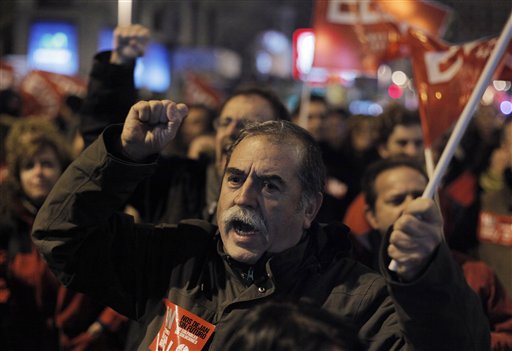(AP) Strikes, protests hit much of European Union
By RAF CASERT
Associated Press
BRUSSELS
With rampant unemployment spreading misery in southern Europe and companies shutting factories across the continent, workers around the European Union sought to unite in a string of strikes and demonstrations on Wednesday.
Most European governments have in recent years had to cut spending, pensions and benefits and raise taxes aggressively to bring public debt under control. That includes not only the most financially troubled governments, like Greece, but also the traditionally more stable ones, like France and Britain.
The result has been a dramatic drop in living standards in many nations that leaders have accepted as collateral for policies they claim are unavoidable. With no end in sight to the economic misery, workers were trying to take a stand on Wednesday.
A Spanish Interior Ministry official says 32 people have been arrested and 15 people treated for minor injuries in disturbances.
Spain’s General Workers’ Union said the nationwide stoppage, the second this year, was being observed by nearly all workers in the automobile, energy, shipbuilding and constructions industries. The government downplayed the impact.
A north-south divide emerged in the participation to the strikes, with unions in wealthier states like the Netherlands and the Nordic nations, where the crisis has not hit that hard, not in the mood for closing down their countries.
Belgium straddles that divide but a 24-hour rail stoppage and scattered strikes through the south of the nation disrupted daily life. Both the Thalys and Eurostar high-speed rail services that connect Brussels with London and Paris were severely disrupted.
From his headquarters nearby, the chief of the EU employers’ federation took a different view.
`’If you start striking at national level and in companies you only will harm the economy,” said Eurobussiness leader Philippe de Buck in an interview. `’And it is not the right thing to do today.”
Europe has been a global trailblazer for union action and workers’ rights over the past half century have been one of the cornerstones of the continent’s vaunted welfare state, with its guaranteed medical care, unemployment benefits and often generous pensions.
Where this was not directly under threat on Wednesday, labor action was more muted.
In Denmark, too, there were no strikes, since cooperation between workers and employers have largely survived the crisis so far.
`’The employers speak the same language as we do and we understand each other’s’ needs and demands,” said Joergen Frederiksen, a 69-year-old retired worker and a former shop steward. `’There are good vibes between us and that means a lot.”
___
Ciaran Giles from Madrid, Geir Moulson from Berlin, Jan Olsen from Copenhagen, Mike Corder from The Hague, Barry Hatton from Lisbon and Elena Becatoros from Athens contributed to this article.

COMMENTS
Please let us know if you're having issues with commenting.